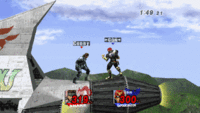Smash directional influence
Smash directional influence, commonly shortened to Smash DI, SDI, or known as Hitstun Shuffling in SSB4, is a mechanic that allows players to slightly alter their position during the freeze frames of being hit by an attack. Tapping the control stick (or C-Stick in Brawl and SSB4) in any direction during freeze frames will slightly move their character in that direction, allowing them to potentially escape multi-hit moves or certain combos. SDI can also be used to move into a wall or ceiling in order to tech near-instantly or to (very minimally) increase the distance from the blast line that the attack is about to send them towards.
Despite its near-identical name, SDI is not a subtype of directional influence (or DI), but a different mechanic altogether that is performable under the same circumstances. The major difference is that, while DI changes the trajectory a character is launched in, SDI changes a character's position before launch. DI does not exist in Smash 64, while SDI does.
Performing SDI
The mechanics of SDI operate by shifting the character in a given direction if a new directional vector of sufficient size is input on that frame. As a result, repeatedly tapping in one direction will move the character much farther than simply holding the stick in that direction. In addition, because diagonals are considered to be two vectors, changing from an orthogonal position to an adjacent diagonal one will generate a new SDI input, while changing from a diagonal position to an adjacent orthogonal one will not. This results in a technique called quarter-circle DI, which involves quickly rotating the stick between two orthogonal positions for increased distance. Quarter-circle DI was introduced to the United States by Japanese smasher Captain Jack and was once known as Japanese DI.
As the C-Stick can also be used for SDI (exclusively in Brawl and SSB4), even more potent forms of SDI exist. So-called double-stick DI utilizes the C-Stick's ability to override the control stick by holding one of the sticks in one direction and utilizing quarter-stick DI with the other.
Automatic smash directional influence
Automatic smash directional influence is a weaker variant of SDI. Once a character's freeze frames are over, they shift slightly in whatever direction the control stick is currently held, slightly less than one SDI input. If the C-Stick is also being held in a direction, it will override the control stick's input, allowing the player to DI in another direction simultaneously. ASDI is significantly less useful than regular SDI and is generally ignored as any stick position during this time is likely to be attempt at regular DI.
SDI multiplier
Beginning in Brawl, several attacks have an SDI multiplier attached to them, which affects how far opponents are able to SDI when hit by them. For example, the looping hits of Mario's down aerial have an SDI multiplier of 1.5, making it easier than usual to escape the attack, while the sweetspot of the Lightning Kick has an SDI multiplier of 0.0, so SDI'ing it is impossible.
In Super Smash Bros. 4, the SDI multiplier of multi-hitting attacks was drastically reduced in general (especially noticeable in Smart Bombs), resulting in multi-hitting attacks being much more difficult to escape via SDI than they were in the previous games (and thus significantly buffing them). The change was so drastic that players playing the demo at E3 2014 initially thought SDI was removed completely, though videos later on would show that SDI did still exist, just subdued in multi-hitting attacks that were especially vulnerable to SDI before.
Shield DI
Similar to SDI, shield DI is a mechanic that allows players to move slightly when their shield is hit. It is nearly identical in its function and how it is performed. During hitlag (and thus before shieldstun) players can smash or hold a direction on the control stick, allowing them to slide along the ground while holding shield. This is especially useful to escape some grounded multihit attacks, perhaps most notably Peach's down smash.
